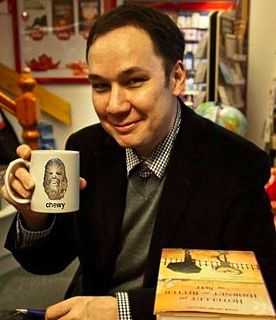A Quote by Colson Whitehead
Best to let the broken glass be broken glass, let it splinter into smaller pieces and dust and scatter. Let the cracks between things widen until they are no longer cracks but the new places for things. That was where they were now. The world wasn't ending: it had ended and now they were in the new place. They could not recognize it because they had never seen it before.
Related Quotes
And at the other end of the bar the world is full of the other type of person, who has a broken glass, or a glass that has been carelessly knocked over (usually by one of the people calling for a larger glass) or who had no glass at all, because he was at the back of the crowd and had failed to catch the barman's eye.
I mean, if you were to find a shattered mirror, find all the pieces, all the shards and all the tiny chips, and have whatever skill and patience it took to put all that broken glass back together so that it was complete once again, the restored mirror would still be spiderwebbed with cracks, it would still be a useless glued version of its former self, which could show only fragmented reflections of anyone looking into it. Some things are beyond repair. And that was me.
Presently he rose and approached the case before which she stood. Its glass shelves were crowded with small broken objects —hardly recognisable domestic utensils, ornaments and personal trifles — made of glass, of clay, of discoloured bronze and other time-blurred substances.
'It seems cruel,' she said, 'that after a while nothing matters... any more than these little things, that used to be necessary and important to forgotten people, and now have to be guessed at under a magnifying glass and labeled: "Use unknown".'
Of all the ruinous and desolate places my uncle had ever beheld, this was the most so. It looked as if it had once been a large house of entertainment; but the roof had fallen in, in many places, and the stairs were steep, rugged, and broken. There was a huge fire-place in the room into which they walked, and the chimney was blackened with smoke; but no warm blaze lighted it up now. The white feathery dust of burnt wood was still strewed over the hearth, but the stove was cold, and all was dark and gloomy.
Often, we try to repair broken things in such a way as to conceal the repair and make it “good as new.” But the tea masters understood that by repairing the broken bowl with the distinct beauty of radiant gold, they could create an alternative to “good as new” and instead employ a “better than new” aesthetic. They understood that a conspicuous, artful repair actually adds value. Because after mending, the bowl's unique fault lines were transformed into little rivers of gold that post repair were even more special because the bowl could then resemble nothing but itself.
I felt I was drawing close to that age, that place in life, where you realize one day what you'd told yourself was a Zen detachment turns out to be naked fear. You'd had one serious love relationship in your life and it had ended in tragedy, and the tragedy had broken something inside you. But instead of trying to repair the broken place, or at least really stop and look at it, you skated and joked. You had friends, you were a decent citizen. You hurt no one. And your life was somehow just about half of what it could be.
Then there were the shabti, magical figurines that were supposed to come to life when summoned. A few months ago, I’d fallen for a girl named Zia Rashid, who’d turned out to be a shabti. Falling in love for the first time had been hard enough. But when the girl you like turns out to be ceramic and cracks to pieces before your eyes—well, it gives “breaking your heart” a new meaning.
When we started on 'Coraline,' there was a whole host of things that we had no idea how we were going to do. Because we were making films in a way that had never really been done before, we were taking this hundred-year-old art form and bringing it into a new era by embracing technology and innovation.
Everything that I saw became something to be made, and it had to be exactly as it was, with nothing added. It was a new freedom: there was no longer the need to compose. The subject was there already made, and I could take from everything. It all belonged to me: a glass roof of a factory, with its broken and patched panels, lines on a road map, a corner of a Braque painting, paper fragments in the street. It was all the same: anything goes.






































